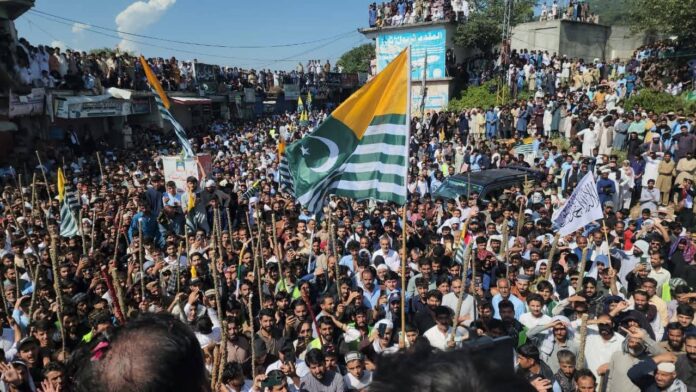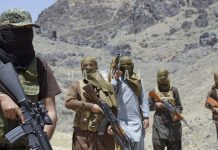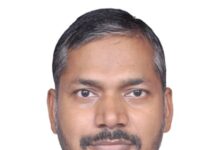Rawalakot/Muzaffarabad, Oct 2 (NVI) On the 4th day of their agitation for rights, tens of thousands of inhabitants of Pakistan-occupied Jammu Kashmir (POJK) moved from various parts towards the capital Muzaffarabad, despite acute repression unleashed by the Pakistani forces.
So, far 12 people have been killed and hundreds injured in firing by Pakistan’s formal and informal forces. The deceased include 9 unarmed protesters and 3 personnel of local police, killed in firing by ‘non-local forces’, according to the Jammu Kashmir Joint Awami Action Committee (JK-JAAC) which is spearheading the agitation that began on September 29.
The Pakistani forces, including paramilitary Rangers and Islamabad Police, have been carrying out oppression against the protesters, despite which a ‘Long March to Muzaffarabad’, capital of POK, is continuing.
The long march began yesterday and people are moving in from all parts of POJK and Gilgit-Baltistan to press their 38-point Charter of Demands.
The protesters keep chanting that Kashmiris will not bow before the State repression and Pakistan’s machinations won’t succeed.
“In Muzaffarabad, there will be no discussion, but only a decision,” said one of the key leaders of the agitation.
The Pakistani regime has imposed a communication blackout, including shutting down of Internet, to prevent information flow out of POJK.
Along side, a severe crackdown is being undertaken to crush the protests. Some key members of JAAC have also disappeared mysteriously, suspectedly abducted by the Pakistani intelligence agencies.
“Since September 29, a peaceful public movement has been met with state repression, human rights violations, restrictions on civil liberties, and the killing of innocent civilians,” said a press statement issued by JAAC’s Core Committee member Sardar Umar Nazir Kashmiri.
According to Nazir, state forces and non-local personnel have carried out indiscriminate firing, killing at least 9 unarmed civilians and injuring hundreds more.
“Tragically, three personnel of the Azad Kashmir Police have also been killed by bullets fired by non-local forces,” he said.
He issued an urgent appeal to the international media and global human rights organizations, calling for “immediate attention to the ongoing crisis in Pakistan-administered Kashmir.”
Nazir said, “Since September 28, the Government of Pakistan has enforced a complete communication blackout across Azad Kashmir, suspended mobile networks, internet, and landline connections, effectively cutting off millions of people from the outside world. Inter-provincial highways have been blocked to deliberately create shortages of essential goods, food, and fuel, while cases are being registered against JK-JAAC leaders, activists, and journalists.”
He underscored that these actions “are not only a gross violation of human rights but also a clear breach of the United Nations Charter, the Universal Declaration of Human Rights (1948), and the International Covenant on Civil and Political Rights (ICCPR), which guarantee every individual the right to life, liberty, peaceful assembly, and freedom of expression.”
Highlighting the peaceful and constitutional nature of the ongoing struggle, Nazir reaffirmed that the JK-JAAC’s movement is rooted in the 38-point Charter of Demands submitted months ago, which remains unimplemented despite the government’s commitment in December 2024 to act upon 12 of its key points.
The demands include abolition of 12 reserved seats in the POJK Assembly for refugees settled in Pakistan, transfer of full powers and funds to local governments, independent and across-the-board accountability, elimination of unnecessary and excessive perks of the ruling elite, bureaucracy, and judiciary.
The demands also include restoration of student unions, fixed quotas for persons with disabilities,free and quality healthcare and education for all citizens, provision of interest-free loans to youth, tax reductions, recognition of rights of Mangla Dam affectees, meaningful judicial reforms, improvement of mobile services and elimination of corporate exploitation, provision of clean drinking water, support and opportunities for agricultural growth, protection of forests and prevention of illegal timber smuggling, establishment of the Azad Kashmir Expressway, construction of Leepa Valley Tunnel and Haveli–Bhadi Tunnel, reconstruction of the Azad Pattan–Sone road network, and the complete eradication of bribery, nepotism, and corruption in government institutions.
Nazir underscored that “Pakistan-administered Kashmir remains a disputed territory under UN Security Council resolutions” and “attempts by elements of the Pakistani establishment and non-State forces to crush a peaceful movement through violence constitute violations not only of the principle of self-determination but also of fundamental UN principles and the Geneva Conventions.”
Nazir strongly criticized sections of the Pakistani media for spreading false and misleading narratives to conceal ground realities from Pakistan’s 250 million citizens and the international community.
He appealed to international media outlets to immediately dispatch representatives to the region to report on the crisis.
He also called upon the United Nations, OIC, European Union, Amnesty International, Human Rights Watch, and other global human rights bodies to urgently intervene, conduct independent investigations, and pressure Pakistan to end the bloodshed.
While welcoming the Prime Minister of Pakistan’s offer for dialogue, Nazir made clear that meaningful talks require an immediate end to the communication blackout.
He further announced that the JK-JAAC will pursue legal action to secure justice for martyrs and victims of state violence, with over 100 civilians already wounded by live ammunition in the past days.
“Our struggle is peaceful, just, and constitutional,” Nazir declared. “We will not take up arms. But silence from the international community will only embolden perpetrators of human rights abuses and intensify the anger of the people.” (NVI)








